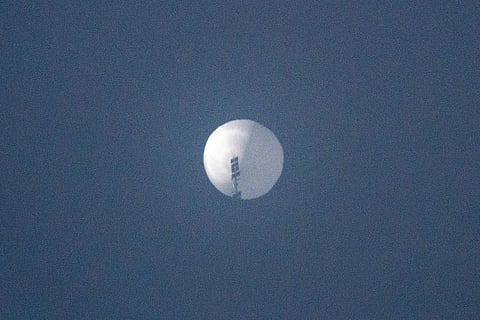
- NEWS
- the EDIT
- COMMENTARY
- BUSINESS
- LIFE
- SHOW
- ACTION
- GLOBAL GOALS
- SNAPS
- DYARYO TIRADA
- MORE

As an election in democratic Taiwan looms, Chinese balloons have appeared around the island at various times of day in what its military says is a new form of "grey zone" harassment.
China already flexes its military prowess against self-ruled Taiwan daily, sending fighter jets, reconnaissance drones, and naval ships around the island.
But since December, Taiwan's defense ministry has said that mysterious balloons have crossed the narrow Taiwan Strait separating the island from China in a kind of "grey zone" harassment.
"Grey zone" tactics are aggressive actions deployed by a state that stops short of open warfare. Experts say that is what China has been doing with its show of military force around the island.
Days before a presidential election, some balloons have flown directly above Taiwan, with at least one detected around a military airbase.
"Beijing is signaling that it can violate Taiwanese airspace at will and challenge its sovereignty," said Raymond Kuo, Taiwan Policy Initiative director at RAND Corporation.
Self-ruled Taiwan is claimed by China as part of its territory, with Beijing's leadership vowing to bring the island under its control.
The 13 January election pits frontrunner Lai Ching-te — whose ruling Democratic Progressive Party says Taiwan is a sovereign nation — against two others who have pledged warmer relationships with Beijing.
The timing of the balloons' appearance is "political", said Kuo.
"The CCP (Chinese Communist Party) is attempting to demoralize the Taiwanese public in the run-up to next week's presidential and legislative elections," he told AFP.
But its military purpose is "in line with broader China's grey zone coercion strategy towards Taiwan".
"Beijing is adding yet another operational challenge to Taiwan's defense forces, which could erode readiness and resilience," he said.
After initially saying they were weather balloons, Taipei's defense ministry on Saturday called them "an attempt to use cognitive warfare to affect the morale of our people".
It also said they posed a "serious threat" to aviation routes.
When asked about the balloons, China's defense ministry dismissed allegations of interference and accused Taiwan of trying to "manipulate the election".
Balloons from China became a politically fraught topic last February when the United States shot down what it called a spy balloon. Beijing has said it was a civilian airship blown off-course.
More than 20 balloons have crossed the sensitive median line separating China from Taiwan since December, with at least seven of them passing directly over the island.
Sighted during the daytime and evenings, they move at altitudes ranging from 12,000 to 36,000 feet (3.6 to 11 kilometers), according to Taipei's defense ministry.
With commercial flights usually cruising between 24,000 and 40,000 feet (7.3 to 12 kilometers), the balloons around Taiwan "do pose a threat and potentially cause disruption to air traffic", said independent aviation expert Gerry Soejatman.
Weather balloons would disintegrate upon impact, but if they carry a different payload such as those seen over the United States, Soejatman said, they "pose a severe risk of damage to commercial aircraft it collides with".
Either way, they would be "a massive nuisance" for pilots, he told AFP.
Calling it "irresponsible" to send the balloons at such heights, defense analyst Su Tzu-yun said the "political goal is far more than the military goal".
"They (China) want to create doubts and nervousness to go with the 'danger of war' sentiments in an attempt to change Taiwanese people's attitude towards the election," he told AFP.
In 1996, Beijing conducted a series of missile tests in waters surrounding Taiwan.
The tests were intended to intimidate voters from casting a ballot for then-president Lee Teng-hui, said James Char, China researcher at Singapore's Institute of Defence and Strategic Studies.
"They pushed too hard," he said. "It actually backfired. That caused the Taiwanese to vote in favor of (a president with) non-pro-China, non-pro-unification policies."
Ivy Kwek of the International Crisis Group said "the more Beijing employs coercion on Taiwan, the less effective these actions will have on striking fear in the Taiwanese public".
"This is now an everyday scenario that Taiwanese people live with," she said.
Supporters of Lai said they were not afraid.
"China often tries to intimidate Taiwan, but we Taiwanese are not easily frightened," said a woman surnamed Zheng, 62, adding that "less clear-headed people might get scared and vote for unprincipled politicians".
One proposed just shooting them down.
"I thought it was already too much when their planes came over, and now balloons? They should have been shot down long ago," said Chen, a retired shopowner.
